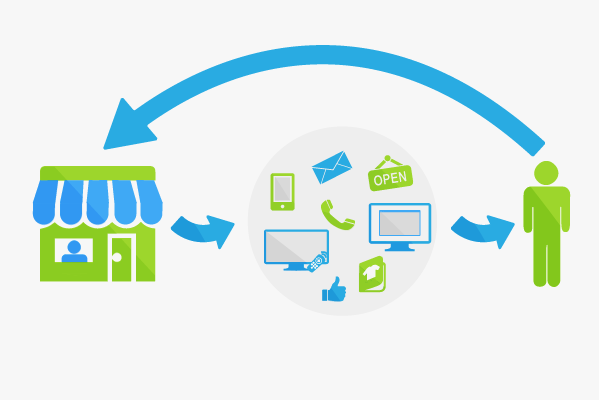Multi Channel Marketing
Multichannel marketing refers to an approach in which customers can contact retailers or service providers in several ways (channels) to place an order.
Multiple sales and communication channels
Today, customers no longer approach companies through just one communication channel and do not restrict themselves to a single distribution channel. If customer A only purchases in over-the-counter stores and customer B only in online stores, then the sales generated by customer B are lost to a store only engaging in over-the-counter sales. Likewise, a pure online store will have to forego the sales of customer A. Multichannel marketing, on the other hand, aims to offer several sales channels in order to capture both customer A and customer B. As a result, the entrepreneur, who conducts his business through multiple channels, has fundamentally greater sales opportunities than one who is limited to only one channel.
Typical distribution and communication channels
A division of the distribution possibilities is typical for multichannel marketing in several ways, including:
- Fixed location sale at a store with personal advice on the spot
- A kiosk system that informs about a product
- Mail order distribution with orders taken by telephone, e-mail or fax
- Distribution through an online store or auction platform on the Internet with web form orders
- Sales via mobile Internet applications (e.g. shopping apps for smartphones and tablets)
- Mobile sales through commercial agents
- Mobile trade (e.g. sales on the weekly market)
- Teleshopping with order by phone as a result of TV advertisements
Multichannel strategies are also possible and to be recommended in regard to communication with consumers. In addition to the traditional communication channels such as telephone, fax, email, and letter mail, companies can offer additional contact options, for example a contact form on the company website, a commentary function in the corporate blog, social media profiles (e.g. such as Facebook or Twitter), or online forums. Personal consulting in the store would be part of the communication strategy as long as a fixed location business exists.
Interlinking
An important strategic decision in multichannel marketing is the degree of interlinking between the individual distribution channels. There are companies that separate their online business strictly from the store business. Other companies, however, link online and offline offers. Examples for this are:
- Bonuses that apply both online and at the store business
- Goods ordered online can be delivered free of charge to a branch and be picked up there
- Goods ordered in the online store can be returned at a store
- Advertising for the online store within the over-the-counter store and vice versa
- Information on each product in the online store with regard to what local store has the desired article in stock
For the customer, the close interlinking of the various sales channels is a comfort and convenience for consulting and purchasing. However, the effort and costs involved in a functioning cooperative is also greatly increased. Not every company is capable of this financial and organizational challenge. In the strict separation of distribution channels, the aforementioned customer advantages will be eliminated. However, the entrepreneur can focus on his core competences and provide consumers with a better service in their respective distribution channel.
Advantages of multichannel marketing
In addition to better market coverage, which allows new customer groups to be developed, multichannel marketing can also reduce sales costs, for example if several advertising channels can be covered by one advertising campaign. Multichannel marketing also constitutes risk distribution. If a sales channel is not generating any sales or is not running well enough, sales from the other distribution channels can absorb the losses, if necessary. The business risk decreases.

